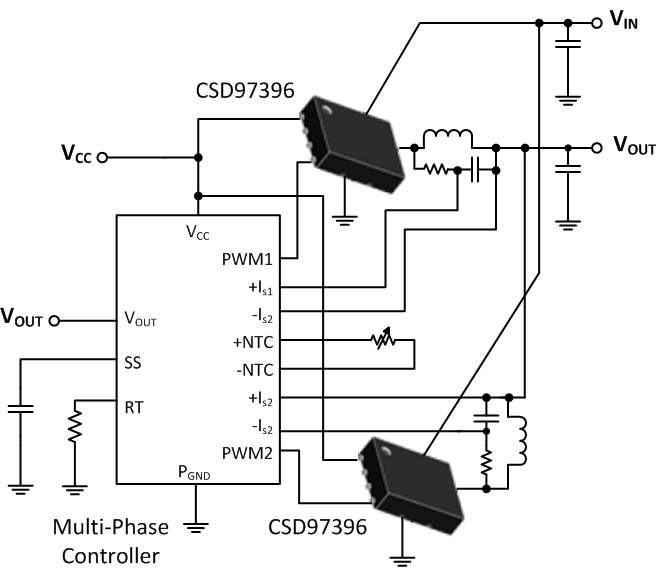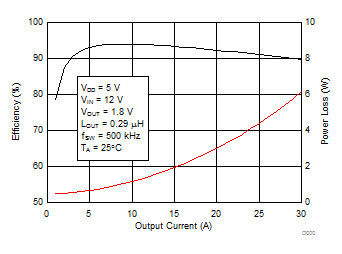SLPS572 December 2015 CSD97396Q4M
PRODUCTION DATA.
- 1 Features
- 2 Applications
- 3 Description
- 4 Revision History
- 5 Pin Configuration and Functions
- 6 Specifications
- 7 Detailed Description
- 8 Application and Implementation
- 9 Layout
- 10Device and Documentation Support
- 11Mechanical, Packaging, and Orderable Information
Package Options
Mechanical Data (Package|Pins)
- DPC|8
Thermal pad, mechanical data (Package|Pins)
Orderable Information
1 Features
- Over 93% System Efficiency at 15 A
- Max Rated Continuous Current 30 A, Peak 65 A
- High Frequency Operation (up to 2 MHz)
- High Density – SON 3.5 mm × 4.5 mm Footprint
- Ultra-Low Inductance Package
- System-Optimized PCB Footprint
- Ultra-Low Quiescent (ULQ) Current Mode
- 3.3 V and 5 V PWM Signal Compatible
- Diode Emulation Mode With FCCM
- Input Voltages up to 24 V
- Tri-State PWM Input
- Integrated Bootstrap Diode
- Shoot-Through Protection
- RoHS Compliant – Lead Free Terminal Plating
- Halogen Free
2 Applications
- Ultrabook/Notebook DC/DC Converters
- Multiphase Vcore and DDR Solutions
- Point-of-Load Synchronous Buck in Networking, Telecom, and Computing Systems
3 Description
The CSD97396Q4M NexFET™ Power Stage is a highly optimized design for use in a high-power, high-density synchronous buck converter. This product integrates the driver IC and NexFET technology to complete the power stage switching function. The driver IC has a built-in selectable diode emulation function that enables DCM operation to improve light load efficiency. In addition, the driver IC supports ULQ mode that enables connected standby for Windows® 8. With the PWM input in tri-state, quiescent current is reduced to 130 µA, with immediate response. When SKIP# is held at tri-state, the current is reduced to 8 µA (typically 20 µs is required to resume switching). This combination produces a high current, high efficiency, and high speed switching device in a small 3.5 × 4.5 mm outline package. In addition, the PCB footprint is optimized to help reduce design time and simplify the completion of the overall system design.
Device Information(1)
| ORDER NUMBER | PACKAGE | MEDIA AND QTY | |
|---|---|---|---|
| CSD97396Q4M | SON 3.5 × 4.5 mm Plastic Package |
13-inch reel | 2500 |
| CSD97396Q4MT | 7-inch reel | 250 | |
- For all available packages, see the orderable addendum at the end of the data sheet.
SPACER
Application Diagram

Typical Power Stage Efficiency and Power Loss
